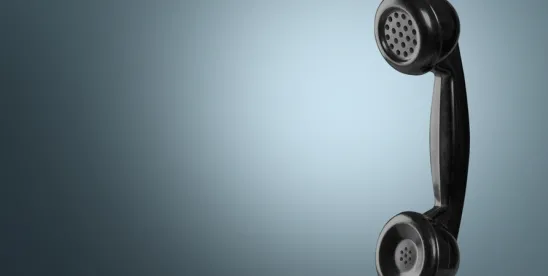So a doctor out in Maryland had about 4,000 patients and wanted to reduce that number to 300 because, well, he was just to dang busy.
In order to facilitate the reduction the good Doctor elected to advise his patients that he was going to be letting about 90% of them go. He did the right thing–in my view–and attempted to reach out to them, first by email, and then by phone.
One of the recipients of the calls, however, was a lady named Kimberly Derossett. She used to visit the Doctor for years but then decided to switch doctors (not clear why from the opinion.) But although she stopped going to her previous doctor, he considered her a patient still since he did not know she had a new doctor.
But Derossett considered the doctor a nuisance and sued him under the TCPA. She argued that the calls he made were actually marketing calls–because although he was calling to dump 3,700 patients he was also calling to enroll “on a first come first serve” basis 300 patients into his new micro-practice. So in Derossett’s mind this was also marketing, and not mere informational calling. (The old dual purpose issue!)
Derossett believed the distinction was critical because she admitted she had given the doctor her phone number. So the Doctor had the right to call her regarding matters related to his practice and her care (which an informational message advising her she was being dumped from his practice would certainly be.) But, she maintained, the Doctor messed up by simultaneously inviting her to join his new subscription based practice. That was marketing, and not allowed because no PEWC was provided.
But the Court disagreed with this dichotomy in this case. The reason? The calls were healthcare related. And the FCC has held that healthcare calls–even if they contain marketing–do not require written consent. Regular express consent is sufficient. See § 64.1200(a)(2)
In the Court’s view the calls were healthcare related because:
they relate to patients’ care and services—indeed, each call discussed impending changes to patients’ primary care. In the first call, Dr. Patrowicz referenced a letter he had sent in which he announced that his practice would be downsizing and he invited his patients to ask questions about the impending “changes” to their “healthcare program.” In the second call, he explained that his downsized “medical practice” was nearly full and encouraged any other interested patients to sign up while spots remained. Dr. Patrowicz called his patients to warn them that they would soon lose their doctor if they did not sign up for his new practice. It is hard to imagine a message more related to “health care” than one that notifies a patient that she may soon lose her doctor.
The Court pointed out that the entire purpose of the healthcare exception was to convert marketing calls about healthcare into informational calls. And that means even a dual purpose call did not require written consent in this context.
The case is Derosset v. Patrowicz, D.O. 2022 WL 4448859 (D. Md. Sept. 23, 2022) and it is a great one to keep in mind for anyone out there who is making healthcare related calls. Keep in mind you still need valid EXPRESS consent to communicate healthcare messages with consumers. But if you have such consent you can make dual purpose and marketing calls WITHOUT written consent and using regulated technology.




 />i
/>i

